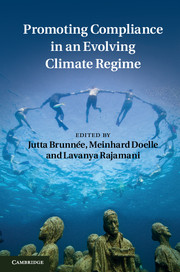Book contents
- Frontmatter
- Contents
- Contributors
- Preface
- Abbreviations
- Introduction: The role of compliance in an evolving climate regime
- Part I Context
- Part II The Kyoto compliance system: Features and experience
- Part III Compliance and the climate regime: Issues, options, and challenges
- 7 The role of non-state actors in climate compliance
- 8 Facilitation of compliance
- 9 Enforcing compliance in an evolving climate regime
- 10 Financial mechanisms under the climate regime
- 11 Post-2012 compliance and carbon markets
- 12 Compliance and the use of trade measures
- 13 ‘Comparability of efforts’ among developed country parties and the post-2012 compliance system
- 14 From the Kyoto compliance system to MRV
- 15 Compliance in transition countries
- 16 Developing countries and compliance in the climate regime
- 17 The role of dispute settlement in the climate regime
- 18 Depoliticizing compliance
- Part IV A look forward
- Bibliography
- Index
- References
7 - The role of non-state actors in climate compliance
Published online by Cambridge University Press: 05 January 2012
- Frontmatter
- Contents
- Contributors
- Preface
- Abbreviations
- Introduction: The role of compliance in an evolving climate regime
- Part I Context
- Part II The Kyoto compliance system: Features and experience
- Part III Compliance and the climate regime: Issues, options, and challenges
- 7 The role of non-state actors in climate compliance
- 8 Facilitation of compliance
- 9 Enforcing compliance in an evolving climate regime
- 10 Financial mechanisms under the climate regime
- 11 Post-2012 compliance and carbon markets
- 12 Compliance and the use of trade measures
- 13 ‘Comparability of efforts’ among developed country parties and the post-2012 compliance system
- 14 From the Kyoto compliance system to MRV
- 15 Compliance in transition countries
- 16 Developing countries and compliance in the climate regime
- 17 The role of dispute settlement in the climate regime
- 18 Depoliticizing compliance
- Part IV A look forward
- Bibliography
- Index
- References
Summary
Introduction
Non-state actors have helped to advance the international climate regime since its inception. They breathed life into initial commitments in 1992, playing a ‘prominent role in galvanizing support’ for the UN Framework Convention on Climate Change (FCCC) that emerged from the Rio Conference. By one account of Rio, ‘the ratio of NGO participants to UN and government officials was one to one’. Jessica Mathews has noted that ‘NGOs set the original goal of negotiating an agreement to control greenhouse gases long before governments were ready to do so, proposed most of its structure and content, and lobbied and mobilized public pressure to force through a pact that virtually no one else thought possible before the talks began’. Mathews argues that non-governmental organizations (NGOs) ‘penetrated deeply into official decision-making’ at the 1992 Conference. Non-state actors have been very demanding of negotiators ever since – supporting (and in some cases opposing) a robust climate regime. They have even participated directly in negotiations, to a point. While this level of non-state participation is not universally acclaimed (indeed, it is contested by some states and scholars) many states have welcomed and facilitated non-state access.
Non-state actors have also been welcomed as observers of the compliance process as commitments to cooperative action and greenhouse gas (GHG) reductions emerged in 1998 at Kyoto and have continued to evolve in negotiations for a climate change framework beyond 2012. Transparency has become a key feature of climate compliance. As Jennifer Morgan notes in her contribution to this volume, ‘on a high level, all parties have agreed to a greater level of reporting, review, and verification than ever before’. This commitment to openness is vital. In addition to facilitating cooperative or enforcement interventions to resolve non-compliance, information access promotes broader public awareness of the climate change problem and informs debate about the effectiveness of measures designed to address that problem. It also, not coincidentally, links constituents to the work of their state representatives and facilitates more articulate public demands for action (as noted above, these demands have been a critical feature of constructing the climate regime since its inception).
- Type
- Chapter
- Information
- Promoting Compliance in an Evolving Climate Regime , pp. 149 - 176Publisher: Cambridge University PressPrint publication year: 2011
References
- 1
- Cited by



